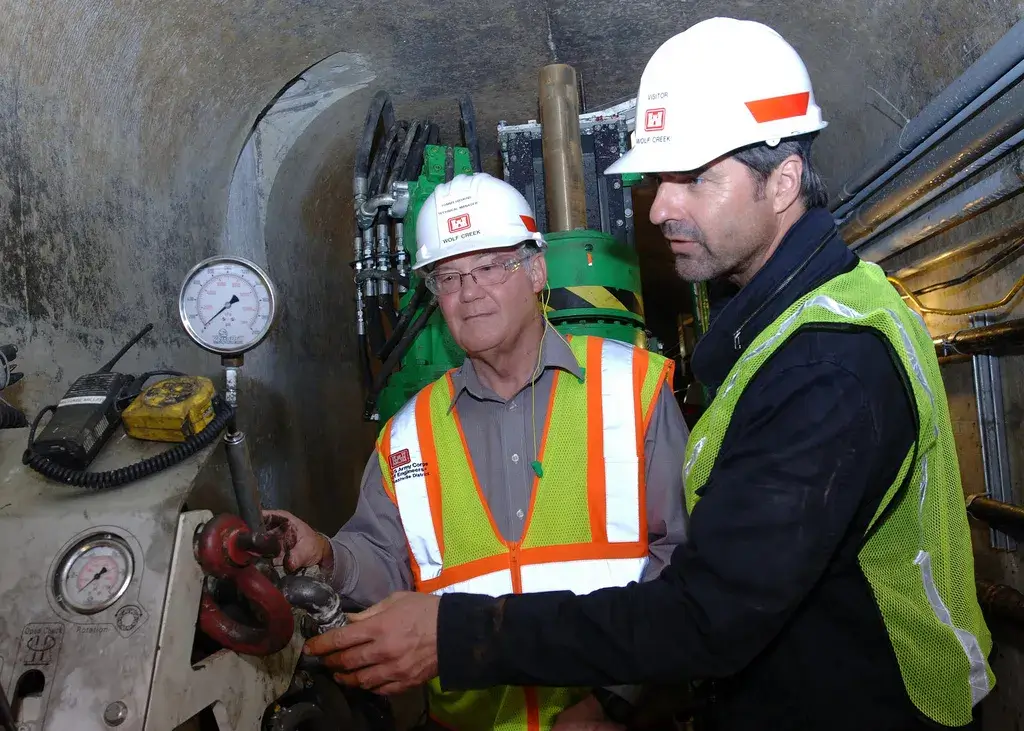Are you looking to make a career change and jump into the basic industries? If so, then this blog post is for you!
We’ve rounded up 15 best-paying jobs in basic industries that offer great work-life balance and job security. Read on to find out which ones might be right for you! You can earn much money in various careers, from software engineers to medical doctors.
Finding the perfect job is a challenging task. With an ever-changing job market and a flooded pool of applicants, finding a career that suits your qualifications, pays well, and offers stability can take time and effort.
The job market continues to evolve in the basic industries, providing a variety of positions with competitive pay. A successful job search depends on the qualifications and experience of the candidate, as well as their willingness to accept roles that may be challenging in terms of working hours or other factors.
Many lucrative job opportunities are available in the basic industries, which make up an important part of the global economy. Job seekers looking for a financially rewarding career should look no further than these industries, as they provide some of the best paying jobs in basic industries.
In this article, we will look at the 15 best paying jobs in basic industries and what makes them attractive to potential employers.
What Are Basic Industries?
Basic industries are a type of industry that produce raw materials that are used for other industrial processes. These industries create raw material products such as metals, chemicals, and wood.
Basic industries also provide services that support the production of goods in other sectors. They play an important role in both local economies and global supply chains.
The term “basic” refers to the fact that these sectors produce base materials or components that can be used by other businesses to manufacture their products.
Basic industries help to drive economic growth and create jobs by providing essential supplies and services needed for manufacturing activities.
Some examples of Basic Industries include metalworking, chemical production, transportation, construction, paper-making, and energy production.
Basic industries can have a major impact on the economy since they tend to be capital-intensive operations that require large investments in equipment and technology upfront before any product is made available for sale.
Basic industries are essential to the economic well-being of a country. They are responsible for producing goods and services that provide employment and income to many people.
Basic industries include retail, food services, wholesale trade, manufacturing, astronomy, geology, agriculture, and forestry. Many of these industries offer highly paid jobs that require specific skills and knowledge.
What Are Basic Industries Jobs?
Basic industries are the backbone of the economy, providing essential goods and services to consumers and businesses alike. These industries supply raw materials, manufacture products, and provide ancillary services critical to production and distribution.
First are those in manufacturing, which take raw materials or components from other industries and turn them into finished goods. Jobs in this sector range from automation engineers who ensure machines run properly to assembly line workers who put together components by hand.
On-site quality control is also a major component of manufacturing operations, ensuring that all output meets safety standards before being shipped to customers.
In addition to manufacturing, there are many other basic industry jobs such as metalworking, mining, transportation logistics, warehousing/distribution centers, and energy production.
Best Paying Jobs In Basic Industries
The job market has grown significantly in the last few years, making it difficult for job seekers to decide which career path is best for them. While certain industries may be more glamorous than others, many basic industries provide some of the highest paying jobs available.
These jobs are often overlooked but offer unparalleled opportunities for those pursuing a lucrative career. It covers jobs in engineering, finance, and everything in between that are among the best paying in basic industries.
1. Petroleum Engineer
A Petroleum Engineer is a professional who works in oil production and related industries. They specialize in developing and managing oilfields, including exploration, drilling, extraction, and refining of crude oil deposits.
The primary role of a Petroleum Engineer is to ensure that all operations are working safely and efficiently. Petroleum engineering is a highly specialized field of engineering dedicated to the exploration, extraction, and management of oil and gas resources.

Petroleum engineers use their knowledge of geology, engineering principles, and mathematics to design, construct and maintain drilling sites.
They also generate reports on exploration results, ensure safety standards are met, and work with other professionals to develop cost-effective ways to maximize oil and gas production profits.
A successful petroleum engineer must have a solid understanding of geology, physics, and mathematics and experience in the oil and gas industry.
Petroleum engineers typically hold a bachelor’s degree in petroleum engineering or a related field, such as mechanical or chemical engineering.
Many employers also require certification from The Society of Petroleum Engineers (SPE) or The American Association Of Petroleum Geologists (AAPG).
The job duties for a petroleum engineer vary depending on the project they are working on but generally involve designing drilling plans/operations; analyzing data collected during exploration activities; constructing wells; developing cost-effective ways to maximize profits from oil and gas production; writing reports on findings; overseeing safety protocols, and collaborating with other professionals such as geologists or chemists.
With the right qualifications and experience, you can become a pipeline petroleum engineer – one of the best paying jobs within oil & gas transmission companies. Petroleum Engineers have expertise in geology, physics, and chemistry and engineering fundamentals such as thermodynamics and fluid mechanics.
Petroleum Engineers must understand how various factors affect the flow of hydrocarbons through different rock formations. They can develop cost-effective extraction methods while considering environmental regulations related to their industry.
In addition to managing existing oil fields, Petroleum Engineers research new technologies that they can use for improved productivity and efficiency.
Salary of Petroleum Engineer
The salary of a petroleum engineer is highly sought after due to the lucrative nature of the job. Petroleum engineers are responsible for developing, extracting, and maintaining oil and natural gas reserves, making them an integral part of the energy industry.
The salary for a petroleum engineer varies greatly depending on factors such as experience level, geographic location, and position within the company. With an average salary of $137,330 in 2020, petroleum engineering is one of the best-paying jobs in the basic industries sector.
According to the U.S. Bureau of Labor Statistics (BLS), in 2019, the median annual wage for petroleum engineers was $137,170. However, salaries can range from around $90K to over $200K per year, depending on these factors mentioned earlier.
Additionally, many employers offer bonus incentives that may factor into petroleum engineers’ total earnings. Petroleum engineers with higher levels of experience or specialized certifications may command higher salaries than other professionals in this field.
2. Mining Manager
Mining Manager is a job title for professionals responsible for overseeing mines’ operations. With the expansion of mining operations worldwide, Mining Managers play an increasingly important role in ensuring safety and efficiency.

Mining managers play a vital role in the mining industry. They are responsible for overseeing the entire operation of a mine, from planning and organizing to ensuring safety protocols are met.
Mining managers also ensure that all machines and equipment used in the mining process are working correctly and efficiently. From hiring personnel to monitoring production output, mining managers have various tasks to manage daily.
Mining managers must possess a deep understanding of the industry and extensive knowledge in multiple areas, such as engineering, geology, and business management.
They should also be able to communicate effectively with other team members and stakeholders. Most importantly, they must remain up-to-date on all regulations related to safety standards within the industry – failure to do so can lead to severe consequences for both them and their employers.
Mining Managers handle several responsibilities, including supervising workers, monitoring equipment, conducting research and development projects, managing budgets and resources, developing new technologies and processes for mining operations, and ensuring compliance with regulations.
They must have extensive knowledge about all mining operations to succeed in their roles. Mining Manager is a job title given to professionals responsible for overseeing mines’ operations. With the expansion of mining operations worldwide, Mining Managers play an increasingly important role in ensuring safety and efficiency.
A Mining Manager typically holds at least a Bachelor’s degree in Mining Engineering or a related field, such as Geology or Environmental Science. They must also have experience working on mine sites before becoming a manager.
They must understand the intricacies of establishing safe working conditions while maximizing productivity levels within individual mines.
Salary of Mining Engineer
Mining Managers are highly sought-after professionals in the mining industry. The expertise of these professionals is invaluable to companies searching for minerals and extracting resources from the Earth. As such, their salaries can be quite lucrative, with a median annual salary of around $90,000.
A Mining Manager’s salary depends on several factors, such as experience level, mining location, and company size. In addition to their base pay, many Mining Managers receive additional compensation in bonuses or stock options.
Because most Mining Managers hold degrees in mining engineering or related fields, they are often well-versed in the latest technological advancements affecting their field, making them especially valuable to employers.
In terms of basic industries’ salaries, a Mining Manager, with an annual salary of 152,719 dollars, is among the highest paying jobs, according to the Mining Technology website.
Additionally, computer information systems managers can earn up to 143K per year, while nurse anesthetists earn 132K annually on average. The best-paying positions in coal mines pay more than 60K per year and include Mine Safety Manager (97282), Mine Manager (116992), Mine Geologist (125000), etc.
Overall, having a career as a Mining Manager can be very rewarding if one is willing to put in the time and effort necessary for success!
3. Nuclear Technician
A Nuclear Technician is a professional trained to work in the nuclear industry. They are responsible for working with radiation, radioactive materials, and nuclear power plants, so they must have comprehensive knowledge of physics, chemistry, and engineering principles.
Nuclear Technicians have a variety of roles, including conducting research and development on projects related to the use and application of nuclear technology, as well as providing technical support to operations personnel at nuclear power plants.

Nuclear Technicians must also be familiar with all safety regulations associated with working with radiation and radioactive materials. They must be able to understand complex data from instrument readings and take corrective action if needed.
As part of their responsibilities, Nuclear Technicians may train workers in safety procedures or supervise radiological activities throughout the facility. In addition, they may inspect equipment for proper operation or assist in emergency response planning exercises.
Nuclear Technicians are highly trained professionals who work in the energy production industry by monitoring radiation levels and maintaining safety protocols. They operate specialized equipment such as detectors, gauges, and irradiators to measure radiation levels and take readings.
Nuclear Technicians must thoroughly understand nuclear physics and be skilled in operating nuclear power plants.
Nuclear technicians must complete extensive academic training, including courses in nuclear physics, mathematics, chemistry, and other related fields. Additionally, most employers require certification or licensing with specific safety protocols before hiring an individual as a Nuclear Technician.
Nuclear Technicians monitor radiation levels with specialized equipment, analyze samples, conduct safety tests, maintain nuclear power plant systems, assist with research projects, and provide technical support to other departments within the company.
Additionally, they must stay abreast of all local regulations concerning nuclear power plants and any changes to national standards or procedures that may affect their work environment.
Nuclear Technology is growing rapidly due to the increase in global demand for clean energy sources. As such, opportunities for advancement within this field abound for those willing to invest the time, money, and effort necessary to succeed as a Nuclear Technician.
With increasing complexity in technology comes increased responsibility, so any individual working in this field must have the knowledge, experience, and dedication necessary to ensure safe operation at all times!
Salary of Nuclear Technician
Nuclear technicians are at the forefront of modern science and technology. With their expertise in nuclear fields, these professionals play a crucial role in providing public medical, industrial, and research services. As such, they are highly sought-after in the job market and demand an attractive salary for their skills.
The average salary for a nuclear technician ranges from $60,000 to $75,000 per year, depending on experience and location. Those with more experience working in nuclear fields can expect higher salaries of up to around $100,000 annually.
Higher salaries may also be offered if someone is willing to relocate or work overtime hours due to job demands. Additionally, most states offer bonuses or additional pay if one is certified in hazardous materials handling or radiation protection.
Overall, nuclear technicians hold a lucrative position within various industries with great potential for career advancement.
4. Power Plant Operators
Power Plant Operators are highly skilled professionals responsible for operating, monitoring, and maintaining the machinery that generates electricity. They play a critical role in ensuring that the electrical power supply remains safe, reliable, and efficient.
A power plant’s operation requires extensive mechanical engineering, electronics, and computer technology knowledge and experience managing complicated systems.

Power Plant Operators must possess a strong understanding of thermodynamics, hydraulics, and other scientific principles related to energy production. They also need to be able to interpret technical manuals, blueprints, and other documents related to the operation of their equipment.
Additionally, they must have sound decision-making skills to react quickly in emergencies or when new technologies become available.
Power plant operators are responsible for operating and maintaining the systems that generate and distribute energy. They perform various tasks, such as inspecting and repairing equipment, monitoring performance, maintaining records, and ensuring safety.
Power plant operators work in various industries, including oil and gas, utilities, manufacturing, and power generation.
Primary duties of Power plant operators include equipment maintenance, operating power systems, monitoring power integrity to ensure efficient performance, troubleshooting issues with the system when they arise, conducting tests to measure performance levels, and keeping records of operations and maintenance activities.
In addition to these technical duties, they must comply with safety regulations and policies to ensure the safety of workers and the public. Power plant operators must have strong problem-solving skills and knowledge of electrical systems to operate a power plant successfully.
Salary of Power Plant Operators
The salary of a power plant operator can vary depending on their experience level, geographical location, and type of employer. The Bureau of Labor Statistics (BLS) reports that in May 2019, the median annual wage for all types of power plant operators was $63,190 per year or $30.43 an hour.
Power plant operators in the top 10 percent earned more than $98,190 annually or over $47 an hour. Experience level also plays a role in pay scale; those with more experience earn higher wages than new hires in the field.
5. Natural Sciences Managers
A Natural Sciences Manager is a highly skilled professional responsible for overseeing the work of teams involved in scientific research and development projects. They are in charge of planning, executing, and evaluating research activities to ensure that their team meets its goals and objectives.
Natural Sciences Managers are responsible for leading teams of scientists in the research, development, and advancement of basic scientific knowledge. They oversee activities related to chemistry, physics, and biology. A Natural Sciences Manager typically has prior experience as a scientist before becoming a manager.

The median annual wage for natural sciences managers is $137,900. The job outlook for this field is projected to grow by 6% as the demand for natural resources such as oil and gas continues to increase.
A Natural Sciences Manager oversees employees such as hydrologists that study water to determine the need for social programs and projects. They also manage engineers who design products to extract natural gas and oil from the earth.
Natural Sciences Managers must possess strong leadership skills and comprehensive knowledge of the natural sciences. They must also be familiar with relevant regulations and laws about scientific research.
The manager oversees all aspects of the project, from budgeting to personnel management, while ensuring that they adhere to safety protocols and industry standards.
Additionally, Natural Sciences Managers must have excellent communication skills to effectively coordinate between members of their team and other stakeholders involved in the project.
Overall, Natural Sciences Managers are important in advancing basic scientific knowledge and researching ways to use our planet’s natural resources responsibly.
Salary of Natural Sciences Managers
The salary of natural sciences managers can vary greatly depending on the size and complexity of their organizations. It is important to understand that this type of job may require specialized skills, such as knowledge of mathematics or engineering, to be successful.
Natural sciences managers typically have a variety of responsibilities, including overseeing projects and developing and implementing research initiatives related to natural science fields.
According to PayScale, the median salary for a natural sciences manager is between $90K – $110K per year, with salaries varying depending on experience and location. Those with more than 20 years of experience earn more than those just starting in the field.
Additionally, management positions in larger companies typically offer higher salaries than those in smaller businesses. Education also plays a role in determining one’s salary; those with advanced degrees such as Ph.
6. Chemical Technicians
Chemical Technicians support chemists and chemical engineers in a laboratory setting. The chemistry laboratory technician sets up experiments, analyzes results, maintains equipment, and records findings based on laboratory techniques.
Chemical Technicians are responsible for helping chemists and chemical engineers in their research, experiments, and development of new materials and products. They use specialized equipment to analyze the properties of compounds and solids and test the safety of chemicals.

Chemical Technicians understand the principles of chemistry and can accurately interpret scientific data. They must be capable of working independently while collaborating as part of a team to solve complex problems.
Chemical Technicians must always follow safety protocols when handling hazardous materials. If you don’t possess a bachelor’s degree in Chemistry or a related field, an associate’s degree or relevant work experience may be considered.
Chemical Technicians must be knowledgeable in chemistry principles, laboratory practices, and health & safety regulations. They often create detailed reports on their findings which other scientists in the development process then use.
As experienced professionals, Chemical Technicians have excellent problem-solving skills and adaptability, allowing them to quickly adjust to changing circumstances or requests from supervisors or colleagues.
With experience and knowledge, Chemical Technicians can move up to more complex roles, such as Senior Chemist Technician or Validation Specialist. These positions have higher salaries that reflect the expertise required for them.
Salary of Chemical Technicians
Chemical technicians play an important role in the chemical and pharmaceutical industries. They are responsible for various tasks, including setting up and monitoring experiments, performing laboratory tests, analyzing results, and preparing reports. So what is the salary of a chemical technician?
The median annual salary for Chemical Technicians in the United States is approximately $44,400 per year. This figure can vary depending on experience, qualifications, and location.
For example, those with advanced degrees may see higher salaries than those who do not hold college degrees. Additionally, larger cities pay more than smaller towns or rural areas due to increased demand for these professionals.
7. Chief Executives
Chief Executives are the leading figures of organizations, companies, and corporations. They are responsible for setting the tone and creating strategies to help their organization reach its goals.
Chief Executives oversee all aspects of a business’s operations, including finance, marketing, human resources, and research & development.

The shareholders or Board of Directors typically appoint the Chief Executive. He/she is expected to have strong leadership skills, a clear vision for the company’s future direction, and exceptional decision-making ability.
The Chief Executive will usually provide guidance and support to all other executives within an organization to ensure they remain on track with their objectives. In addition, they must be adept at managing people and financial resources effectively.
Chief Executives are the highest-ranking executives in a business or organization. They preside over all other executive staff and are responsible for setting the overall direction of the enterprise.
Chief Executives have ultimate responsibility for the success of their company: they make strategic decisions, provide guidance to other executives, and ensure that their team is on task.
The qualifications necessary to become a Chief Executive include a combination of education and experience in management or leadership roles.
Most Chief Executives have completed a Master’s degree in Business Administration or a related field, and many have years of experience as an executive at another company before taking on their current role.
Salary of Chief Executives
The salary of a Chief Executive can vary significantly depending on the size and type of organization they manage; however, most CEOs earn six-figure salaries. In addition to salary, many CEOs receive bonuses based on performance metrics such as profits or stock prices.
The salary of a chief executive, also known as a CEO, is typically among the highest paid in an organization. As such, the pay and benefits of a CEO can be significantly higher than that of other company executives or even non-executive employees.
The exact salary of chief executives varies depending on factors such as the size and scope of the company, the experience level and skill set of the individual, and other economic circumstances.
A 2018 survey conducted by Korn Ferry International found that CEOs earned an average annual base salary between $300,000 to $700,000 per year.
However, this does not include bonuses which often provide additional compensation for exceeding expectations or meeting goals. The same survey revealed that some CEOs earn more than $10 million annually after bonuses are included in the total figure.
In summary, Chief Executives are highly paid professionals responsible for managing an organization’s operations and strategy. They possess advanced education and experience in management roles and typically earn generous salaries plus performance-based bonuses.
8. First Line Supervisors of Production and Operating Workers
First Line Supervisors of Production and Operating Workers oversee and coordinate the activities of production and operating workers such as inspectors, precision workers, machine setters, and operators.
They typically need a high school diploma or equivalent and up to a year of formal training. These positions require an excellent speaking voice and a pleasant personality.

First Line Supervisors of Production and Operating Workers are those responsible for directing and overseeing the activities of production workers in all types of organizations.
They are the first line of management, and their duties involve supervising, leading, planning, scheduling, coordinating, assigning tasks to employees, and assessing their performance.
They must also be able to evaluate quality control systems and equipment maintenance and oversee workplace safety procedures. First Line Supervisors need strong communication skills to interact with employees while motivating them during tough times.
They should have problem-solving skills so they can handle any issue that might arise on the job quickly and effectively. First Line Supervisors must possess technical knowledge related to their work area and a good understanding of production processes to ensure smooth operations.
Salary of First Line Supervisors of Production and Operating Workers
A wide range of industries offers the best pay for First Line Supervisors of Production and Operating Workers, including Pipeline Transportation of Crude Oil, Natural Gas Distribution, Retail, Food Services, Wholesale Trade, Manufacturing, Astronomy & Geology. The median annual wage for this occupation is $67,330, with an expected 22,700 additional jobs by 2026.
First Line Supervisors of Production and Operating Workers are essential personnel in the manufacturing industry, managing and overseeing a wide range of staff. They are responsible for ensuring all production and operations’ smooth and efficient running. As such, they often receive an attractive salary for their services.
The Bureau of Labor Statistics (BLS) reports that the average annual wage for First Line Supervisors was $63,100 in May 2019. This reflects a 3 percent growth compared to 2018 ($61,200). Salaries vary depending on experience level, geographic location, size of the company, type of industry, and other factors.
For example, supervisors in industries such as chemical manufacturing typically earn close to $65K per annum, while those working in apparel manufacturing may make around $60K annually. Additionally, wages tend to be higher in metropolitan areas than in rural areas due to increased demand for skilled labor.
With less supervision than in the past due to automation, these supervisors are expected to be more efficient and autonomous in their decision-making process.
They must have good problem-solving skills to ensure that machines run properly and efficiently while maintaining high-quality standards throughout the operation.
9. Geological and Petroleum Technicians
Geological and Petroleum Technicians assist geoscientists with exploring, evaluating, and producing natural resources such as oil, gas, minerals, and water. They are highly skilled professionals who use their geological process knowledge to help with research.
Geological and Petroleum Technicians are an important part of the oil and gas industry. They are responsible for performing laboratory tests on geological samples, such as core samples, rock cuttings, and drill cuttings, for identifying the presence of hydrocarbons.

Geological and Petroleum Technicians also analyze data from seismic surveys to assist in locating potential drilling sites. Additionally, they may support acquiring permits related to mineral exploration or production.
The duties of a Geological and Petroleum Technician vary depending on the job site but typically include collecting and analyzing samples using specialized equipment; mapping geological formations; preparing reports; recording data; designing experiments; providing technical advice about drilling operations; and maintaining lab equipment.
To become a Geological and Petroleum Technician, individuals must have a bachelor’s degree in geology or a related field and experience working with oil-field equipment.
Those who wish to advance their careers may pursue additional certifications or degrees in petroleum engineering or environmental science. The job outlook for these professionals is good, with many opportunities available worldwide due to an increased demand for skilled technicians within the oil & gas industry.
Through their work, they can analyze rocks, drill core samples and examine various types of data to determine the most effective way to develop resources. They also monitor drilling operations to ensure safety standards are met while gathering data at oilfields or other sites.
Geological and Petroleum Technicians must be excellent communicators as they often need to interact with engineers and other workers daily. A Geological or Petroleum Technician requires an associate’s degree in petroleum technology or a related field, such as earth sciences or geology.
Salary of Geological and Petroleum Technicians
Geological and petroleum technicians are specialized professionals who assist geoscientists in extracting natural resources from the earth. These technicians play an important role in the oil and gas industry, helping to obtain hydrocarbons for energy production. But what is the salary of these skilled workers?
The Bureau of Labor Statistics reported that as of May 2018, geological and petroleum technicians had a mean annual wage of $57,790. This figure is slightly higher than the mean wage across all occupations listed at $51,960 during the same period.
Salary may vary based on factors such as geographic location, years of experience, and level of education attained by a technician. For example, those employed in Texas earned an average wage 15 percent higher than their counterparts in the United States.
10. Industrial Machinery Mechanics
Industrial machinery mechanics are responsible for maintaining, repairing, and troubleshooting industrial machinery. This mechanic specializes in the maintenance, repair, and installation of all industrial equipment, such as turbines, conveyor belts, and motors. Industrial machinery mechanics play a critical role in helping to ensure that industrial machines operate efficiently and safely.

Industrial machinery mechanics must understand mathematics, electronics, robotics, and mechanical engineering principles to diagnose problems with the machine’s components or systems properly.
Industrial machinery mechanics also need to understand how the different components interact with each other so they can make repairs or adjustments as needed. Good problem-solving skills are essential because they must quickly determine what is wrong with the machine before it causes more damage or malfunctions.
Some technicians may even specialize in a particular type of equipment like boilers or air compressors.
Industrial Machinery Mechanics must have a strong understanding of different types of machines, how they work and how to diagnose any issues that may arise. Industrial Machinery Mechanics must have good problem-solving skills and mechanical aptitude.
In addition to their knowledge of machinery and troubleshooting skills, Industrial Machinery Mechanics must also be safety conscious when working with machinery.
Industrial machinery mechanics must know how to use safety equipment such as protective eyewear and gloves. Furthermore, they must follow all safety procedures while performing tasks such as lubrication, belt replacement, or cleaning.
Industrial Machinery Mechanics typically work in factories where they inspect machines daily for signs of wear or malfunctioning parts. They then determine what needs to be done to repair the machine or replace any worn parts.
Once the repairs are complete, Industrial Machinery Mechanics will test the machine by running it through its paces to ensure it is functioning properly before returning it to service.
Salary of Industrial Machinery Mechanics
Industrial Machinery Mechanics is a vital part of the workforce, responsible for maintaining and repairing heavy equipment used in various industries.
Industrial machinery mechanics are essential in manufacturing, construction, and transportation. The salary for this profession may be a concern for those considering it.
The Bureau of Labor Statistics reports that the median annual wage for industrial machinery mechanics was $51,160 as of May 2019. This wage is higher than the median wage reported across all occupations nationally during that same period which was $38,640 per year.
Industrial machinery mechanics who work on high-powered machines typically earn salaries at the upper end of this range, while those with more experience or specialized skills are likely to receive higher wages still.
11. Metallurgical Engineers
Metallurgical engineers use engineering principles to develop, produce, and process metals. They use advanced technology and scientific knowledge to research and design metal products like steel, aluminum, copper, iron, and alloys. Metallurgical engineers work in mining and other fields where metals are used.

Metallurgical Engineers are professionals who specialize in the study and manipulation of metals. They use their knowledge to develop metalworking methods that maximize production efficiency, improve product quality, and enhance safety standards.
Metallurgical Engineers are essential for businesses dealing with metal-related products such as automotive parts, aerospace components, medical instruments and tools, electronics, and construction materials.
The role of a Metallurgical Engineer transcends just the study of metals; they also work on the developmental stages of a product, from concept to post-production troubleshooting.
They bring their expertise to every stage in between, from determining which method is most effective to extract raw ore from deposits to examining finished products for quality control.
The Metallurgical Engineer job is also critical in analyzing microstructures and identifying potential problems with metals before they become an issue during fabrication or assembly.
Many companies that need metal production or processing services recruit metallurgical engineers, including Nucor Corporation, North Mining Engineers Inc., and BHP Billiton.
Metallurgical engineers must have excellent problem-solving skills, an understanding of complex chemical processes, and a good eye for detail when creating metal designs.
Salary of Metallurgical Engineers
Metallurgical engineers are highly skilled professionals who use their knowledge of materials and processes to design, develop, produce, and assess metals and other materials used in various industries.
They often collaborate with other engineering disciplines to ensure the production process is safe and efficient. So, what is the salary of metallurgical engineers?
The average annual salary for metallurgical engineers in the United States is approximately $93,000 annually, according to Payscale.com.
However, salaries can vary based on experience, education level, the specific industry they work in, and the size and location of their employer.
Highly experienced metallurgical engineers working for large companies in major metropolitan areas typically earn more than those just starting or working for smaller organizations.
12. Boilermakers
Boilermakers are skilled tradespeople who work in the construction and repair of boilers and other large vessels. They fabricate, assemble, maintain, and repair boilers, tanks, and pressure vessels used for heating systems, water supply systems, industrial process equipment, and more.

Boilermakers use various tools to cut and shape metal parts to size or specifications. They must know welding techniques, blueprint reading, and math calculations.
Boilermakers are highly skilled tradespeople who build, install, maintain, and repair boilers, tanks, and other large vessels that store liquids or gases. They deeply understand the engineering principles involved in welding and fabricating such structures.
As one of the oldest trades in America, boilermakers have been crucial to the development of the industry over the centuries.
Whether it’s a steam engine powering a locomotive or an industrial plant producing fuel for modern transportation systems, boilermakers play an essential role in keeping these machines running efficiently.
Boilermaker skills are also needed in many other industries that rely on large vessels to safely store gas or liquid products.
The work of boilermakers is both physically demanding and mentally challenging. It requires precision welding skills and interpreting complex engineering drawings and diagrams.
Boilermakers also troubleshoot problems with existing systems, identify needed repairs or modifications, determine the materials needed for specific jobs, and order parts or supplies as necessary.
Boilermakers’ job requires great attention to detail and safety consciousness to ensure the safety of workers in their area. A boiler-making career offers excellent employment opportunities with good wages and benefits.
Salary of Boilermakers
Boilermakers are skilled craftspeople who build, manufacture, and repair boilers and other large vessels. They assemble, construct, and maintain various industrial equipment ranging from small tanks to massive boilers.
Boilermakers have an important role in many industrial settings, so it is no surprise they can expect to be compensated well for their labor. The salary of boilermakers depends on various factors such as experience level, location, certifications, and job duties.
According to PayScale, the median annual salary for boilermakers nationwide is $60,596, with the lowest 10 percent making around $39K annually while the highest 10 percent make upwards of $82K per year. Those working in Illinois have a median salary of $71K, while those based in California earn slightly less at around $69K annually.
13. Aerospace Engineers
Aerospace engineers design and maintain aircraft, spacecraft, missiles, rockets, and satellites. They work behind the scenes to create components that allow us to explore space, build airframes that keep us safe while flying long distances and develop new technologies for further exploration.
Aerospace engineers use a variety of skills ranging from mathematics and physics to computer simulations and composite materials engineering to complete their tasks. Aerospace Engineers are responsible for designing, building, and maintaining aircraft, spacecraft, and other related technologies.
They use their knowledge of science, mathematics, and engineering principles to develop vehicles that can travel in the earth’s atmosphere or beyond.

Aerospace Engineers have a high level of expertise in aeronautical engineering and work to create the most efficient machines possible.
Aerospace engineers typically work for government agencies such as the National Aeronautics and Space Administration (NASA), defense contractors such as Boeing or Lockheed Martin, or universities conducting research.
Many pursue graduate degrees specializing in propulsion systems or aerospace structures. With the advances in technology being made every day, these professionals must stay ahead of the curve by staying up-to-date on all the latest developments in their field.
Aerospace Engineers use their skills to assess potential projects’ feasibility, safety, and cost-effectiveness while monitoring developments in aerospace technology.
Aerospace Engineers are employed in many industries, such as defense, commercial aviation, manufacturing, and research/development. With an average salary of $83,335 per year, Aerospace Engineering is one of the best paying jobs in basic industries.
Salary of Aerospace Engineers
Aerospace engineering is a highly sought-after field that offers lucrative salaries for those with the proper qualifications. According to the Bureau of Labor Statistics, aerospace engineers earn an average salary of $117,220 per year as of May 2018.
Aerospace engineers with experience also have the potential to earn a significantly higher salary due to their specialized skills and expertise in this area.
Aerospace engineering is a complex field that requires extensive knowledge and education before entering into entry-level positions.
To become an aerospace engineer, you must obtain at least a Bachelor’s degree in Aerospace Engineering or related fields such as Mechanical Engineering.
Additionally, some employers may require more advanced degrees, such as a Master’s degree or even Ph.D., for you to be considered qualified for certain positions within this field.
14. Food Scientists and Technologists
Food scientists and technologists use their science, technology, engineering, and math knowledge to research, develop and evaluate food products.
They provide expertise in food safety, nutrition, processing, and preservation. Food scientists and technologists can be found in many industries, including academia, government, private, and military.

Food scientists work with various scientific principles to create new food products or improve existing ones. They conduct a chemical analysis on foods for nutritional content and microbial contamination, along with testing for physical properties such as texture, flavor, or color.
Food technologists focus more on the application side of food production by developing processes that ensure safe handling techniques while maintaining product quality. They also analyze data from market research studies to identify consumer preferences, so they can design better products that meet customer expectations.
Food scientists and technologists are highly sought-after professionals who specialize in creating, testing, and inspecting food products. They use their scientific knowledge to develop new recipes, improve existing ones, and ensure that their products are safe for consumers.
A food scientist or technologist develops new food products, analyzes the nutritional content of current foods, assesses the quality of ingredients used in food production, designs methods for producing new foods or improving existing ones, troubleshoots problems with food production processes or products, and ensures that all safety regulations are followed during the manufacturing process.
Salary of Food Scientists and Technologists
Food scientists and technologists often have a degree in a related field, such as food science or technology. They may also possess certifications from professional organizations such as the Institute of Food Technologists (IFT).
Due to their extensive knowledge base and analytical skillset, these professionals can often command handsome salaries. According to PayScale data from 2020, the median salary for food scientists is around $68k annually.
If you are considering a career in food science and technology, one of the most important things to consider is salary. Food scientists and technologists are highly sought-after professionals who specialize in studying and developing food products.
They work with manufacturers and production companies to help create safe, healthy, and flavorful foods for consumers. The salary for food scientists and technologists varies depending on location, experience, education level, industry type, and certification earned.
On average, a food scientist or technologist can expect to earn between $50-80K per year, with specialization often leading to higher salaries. Those with advanced degrees may also have opportunities for additional compensation, such as bonuses or stock options.
Additionally, many employers offer competitive benefits such as health insurance coverage and retirement plans that could further increase employee compensation.
15. Security Professional
Security professionals protect information and assets from unauthorized access, disruption, or destruction. They work with technology and physical security measures to create secure environments for their clients.
Security professionals must be highly trained individuals who understand cybersecurity principles and the laws governing them.

Security professionals provide various services, including but not limited to system installation and maintenance, monitoring of networks, data analysis, risk management, incident response planning, malware detection, and remediation.
They also develop security policies and procedures that allow organizations to protect their confidential information from malicious actors.
Furthermore, they may also be responsible for educating employees on proper cyber hygiene practices to reduce potential risks associated with cyber threats.
The role of a security professional is ever-evolving due to the constantly changing nature of technology.
Salary of Security Professionals
Security professionals plays an essential role in keeping organizations safe and secure. With the rise of cybercrime, businesses must invest more in their security infrastructure and personnel to protect against potential threats. But what kind of salary can a security professional expect?
When determining a security professional’s salary, many factors include experience level, geographic location, and job role. Entry-level positions may pay between $50,000 to $75,000 per annum, while experienced IT security engineers or specialists could command salaries up to $125,000 or higher, depending on their education level and expertise.
An individual working as a Chief Information Security Officer (CISO) can expect salaries typically ranging from $150,000 to upwards of $100,000 or more, depending on the company size.
Final Words on Best Paying Jobs In Basic Industries
In conclusion, the best paying jobs in basic industries are varied and can offer excellent remuneration to skilled and experienced employees. From engineers to computer scientists, many positions can provide workers with a comfortable lifestyle while they continue to pursue their professional goals.
A strong workforce is an important component of these industries, and those who contribute to success are rewarded. Any individual can achieve one of these desirable positions with dedication and hard work, regardless of educational background and career experience.
In addition to their research and development skillset, many food scientists also possess marketing know-how, enabling them to promote their creations effectively internally and externally through promotional campaigns aimed at consumers.
As society places more importance on health consciousness when it comes to dietary choices, demand is growing for experienced individuals in this field who understand consumer needs and preferences while being able to create innovative solutions that meet those needs.
While there are certainly several high paying jobs available in basic industries, it is important to understand the skill set needed for each role and what qualifications you need to apply. These jobs offer great potential career paths, from engineers and IT professionals to surveyors and financial analysts.
Additionally, with the right training and experience, many of these positions can also lead to higher-level roles such as management or executive positions.




